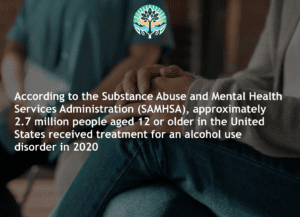Battling addiction can feel like an insurmountable challenge, but the good news is that recovery is possible. Inpatient addiction treatment centers in Indiana, such as Ladoga Recovery Center, offer a crucial lifeline for those struggling with alcohol addiction, providing the structure, support, and care needed to reclaim your life. If you or someone you love is ready to embark on the journey toward sobriety, an inpatient treatment program can be the first step toward healing and lasting change.
The Benefits of Inpatient Addiction Treatment
Inpatient addiction treatment offers a comprehensive approach to recovery. Unlike outpatient programs, where individuals are free to return home after treatment sessions, inpatient programs provide 24/7 care within a safe, controlled environment. This level of support is especially beneficial for those with severe addiction or those who struggle with co-occurring mental health disorders.
At Ladoga Recovery Center, our programs are designed to address the physical, psychological, and emotional aspects of addiction. Here’s how an inpatient treatment program can help:
- Structured Environment for Healing One of the most significant advantages of inpatient treatment is the structured environment it provides. Individuals in inpatient programs follow a daily schedule that includes therapy sessions, group activities, and personal time for reflection. This structure removes the distractions and temptations of everyday life, allowing patients to focus entirely on their recovery.
- Access to Medical Care and Detoxification Services Detoxification is often the first step in the recovery process, especially for those struggling with alcohol addiction. Inpatient addiction treatment centers offer medically supervised detox programs, ensuring that individuals safely withdraw from substances under the care of experienced professionals. At Ladoga Recovery Center, our detoxification program provides medical monitoring to manage withdrawal symptoms and prevent complications.
- Comprehensive Therapy and Counseling Addiction is not just a physical condition—it’s also a mental and emotional struggle. Inpatient treatment centers provide access to a variety of therapeutic services, including individual counseling, group therapy, and family therapy. These therapies help individuals explore the root causes of their addiction, develop healthy coping mechanisms, and rebuild relationships that may have been damaged by substance abuse.Cognitive-behavioral therapy (CBT) and dialectical behavior therapy (DBT) are just a few of the therapeutic approaches used to help patients gain insight into their behaviors and thought patterns. These therapies are essential for long-term recovery as they equip individuals with the tools to handle stress and triggers without resorting to substance use.
- Supportive Community One of the most powerful aspects of inpatient treatment is the sense of community it fosters. Patients in inpatient programs are surrounded by others who are going through similar struggles. This shared experience creates a supportive environment where individuals can build meaningful connections, share their stories, and offer encouragement to one another. The camaraderie found in a treatment center can provide the strength and motivation needed to stay committed to sobriety.
- Personalized Treatment Plans Every person’s journey to recovery is unique, which is why personalized treatment plans are essential. At Ladoga Recovery Center, we take the time to understand each patient’s specific needs, challenges, and goals. Our team works with patients to create a customized treatment plan that includes detoxification, therapy, and aftercare services tailored to their individual situation. This personalized approach ensures that patients receive the support they need at every stage of their recovery journey.

Take the First Step Toward Recovery
Quitting drinking is a transformative decision that can improve every aspect of your life, from your health to your career and personal relationships. While the journey to sobriety can feel overwhelming, it’s important to remember that help is available, and you don’t have to face this challenge alone.
At Ladoga Recovery Center, we offer a safe, supportive environment where you can focus on healing and rebuilding your life. Our programs are designed to empower professionals with the tools they need to achieve and maintain lasting sobriety. Whether you’re seeking a Detox Treatment Program, Residential Treatment Program, or Alcohol Rehab Program, we’re here to help you reclaim your health, happiness, and future.
Take the first step toward healing by reaching out today at (844)628-4917 Our team is ready to provide the support you need to begin your recovery journey.
Frequently Asked Questions
1. What is the difference between inpatient and outpatient addiction treatment?
Inpatient treatment requires individuals to stay at a treatment facility for the duration of their program, providing 24/7 care, supervision, and medical support. Outpatient treatment, on the other hand, allows individuals to live at home while attending therapy sessions during the day or week. Inpatient treatment is generally recommended for those with more severe addictions or those who need detoxification services.
2. Will my insurance cover inpatient addiction treatment?
Many insurance plans offer coverage for inpatient addiction treatment. At Ladoga Recovery Center, we work with a variety of insurance providers to help make treatment accessible. Our admissions team can assist you in verifying your insurance benefits and determining the cost of treatment.
3. How long does inpatient treatment last?
The duration of inpatient treatment varies depending on the individual’s needs and progress in recovery. Treatment programs typically last 30, 60, or 90 days, but longer stays may be recommended for those with severe addiction or co-occurring disorders. The length of treatment will be tailored to each patient’s unique situation.
4. What happens after inpatient treatment?
After completing inpatient treatment, individuals typically transition to an outpatient program or an aftercare program to continue their recovery journey. This may include ongoing therapy, support groups, and other resources to help maintain sobriety and prevent relapse.
5. What types of therapy are offered in inpatient addiction treatment?
Inpatient addiction treatment centers offer various types of therapy, including individual therapy, group therapy, family therapy, and specialized therapies such as cognitive-behavioral therapy (CBT) and dialectical behavior therapy (DBT). These therapies help individuals address the underlying causes of their addiction and develop the skills needed for long-term recovery.
Take Action Today
If you or someone you love is struggling with alcohol addiction, don’t wait any longer to seek help. The journey to sobriety begins with the decision to take that first step toward recovery. At Ladoga Recovery Center, we are here to support you every step of the way.
Call us today at (844)628-4917 to learn more about our programs and how we can help you reclaim your life.
Together, we can make lasting change and help you build a healthier, happier future.

